Essay on Managerial Decision Making: Biases and Rationality
VerifiedAdded on 2022/10/04
|7
|2099
|23
Essay
AI Summary
This essay critically examines managerial decision-making, focusing on biases that affect rational behavior in the real world. It explores three key concepts: overconfidence, bounded awareness, and the importance of fairness and equity. The essay delves into how overconfidence, often considered the 'mother of all biases,' can lead to poor decisions by overestimating one's abilities and neglecting risk factors. It also discusses bounded awareness, where managers may overlook crucial information, resulting in irrational decisions. Furthermore, the essay highlights the impact of fairness and equity in decision-making, emphasizing how treating all members fairly and equally promotes motivation and effective problem-solving. By analyzing these biases, the essay provides insights into the challenges managers face and the strategies needed to make more effective and ethical decisions. The essay uses academic references to support the arguments and analysis.
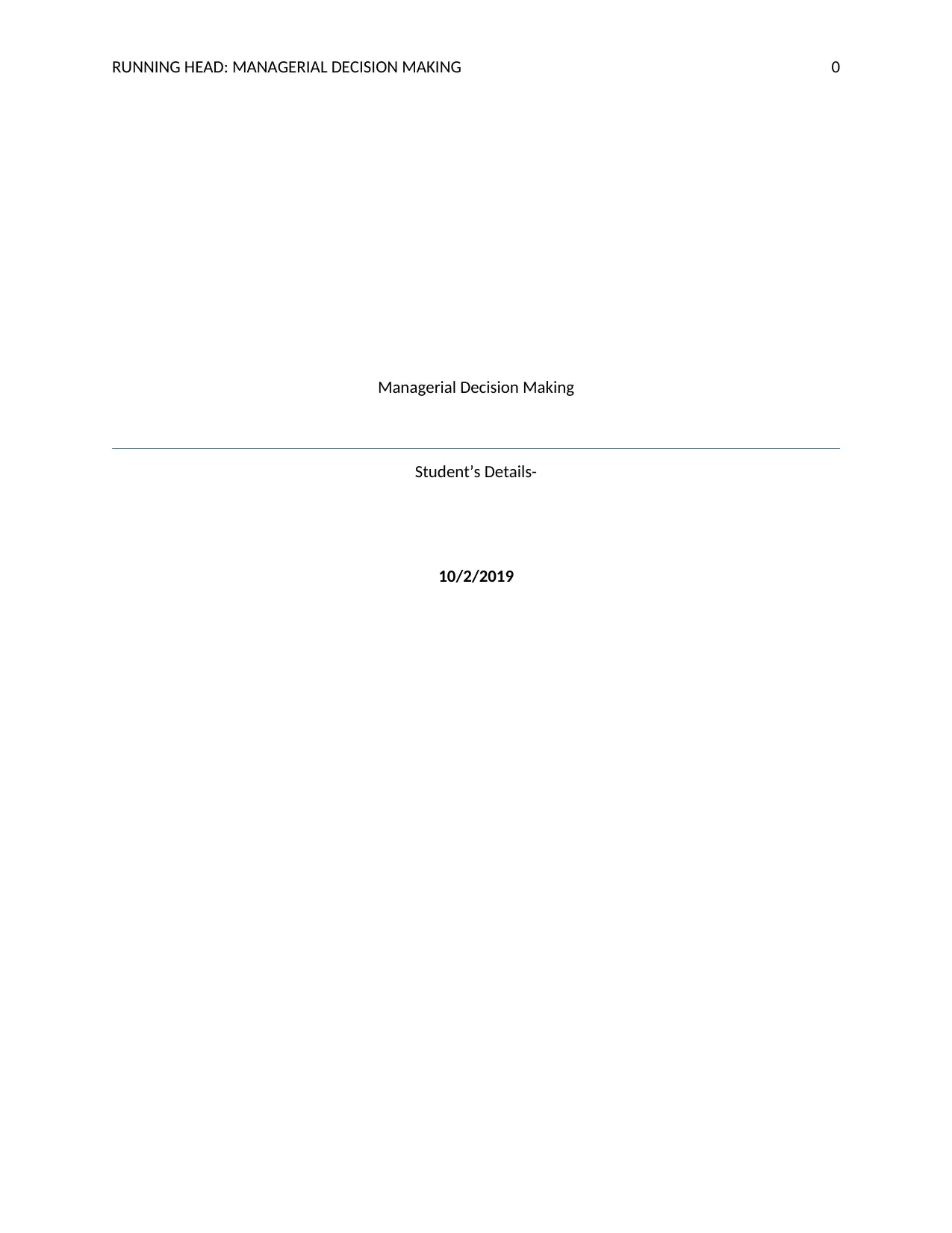
RUNNING HEAD: MANAGERIAL DECISION MAKING 0
Managerial Decision Making
Student’s Details-
10/2/2019
Managerial Decision Making
Student’s Details-
10/2/2019
Paraphrase This Document
Need a fresh take? Get an instant paraphrase of this document with our AI Paraphraser
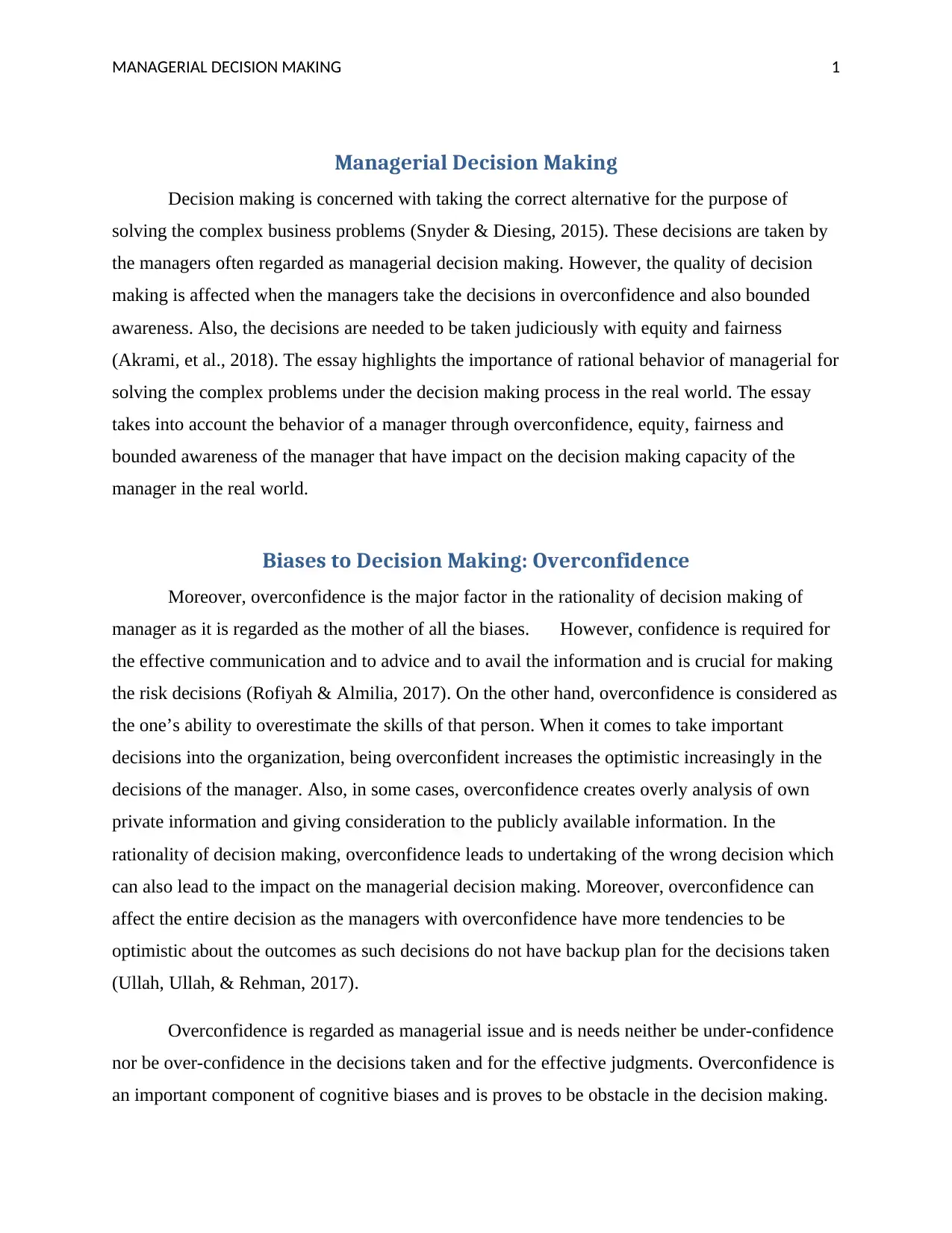
MANAGERIAL DECISION MAKING 1
Managerial Decision Making
Decision making is concerned with taking the correct alternative for the purpose of
solving the complex business problems (Snyder & Diesing, 2015). These decisions are taken by
the managers often regarded as managerial decision making. However, the quality of decision
making is affected when the managers take the decisions in overconfidence and also bounded
awareness. Also, the decisions are needed to be taken judiciously with equity and fairness
(Akrami, et al., 2018). The essay highlights the importance of rational behavior of managerial for
solving the complex problems under the decision making process in the real world. The essay
takes into account the behavior of a manager through overconfidence, equity, fairness and
bounded awareness of the manager that have impact on the decision making capacity of the
manager in the real world.
Biases to Decision Making: Overconfidence
Moreover, overconfidence is the major factor in the rationality of decision making of
manager as it is regarded as the mother of all the biases. However, confidence is required for
the effective communication and to advice and to avail the information and is crucial for making
the risk decisions (Rofiyah & Almilia, 2017). On the other hand, overconfidence is considered as
the one’s ability to overestimate the skills of that person. When it comes to take important
decisions into the organization, being overconfident increases the optimistic increasingly in the
decisions of the manager. Also, in some cases, overconfidence creates overly analysis of own
private information and giving consideration to the publicly available information. In the
rationality of decision making, overconfidence leads to undertaking of the wrong decision which
can also lead to the impact on the managerial decision making. Moreover, overconfidence can
affect the entire decision as the managers with overconfidence have more tendencies to be
optimistic about the outcomes as such decisions do not have backup plan for the decisions taken
(Ullah, Ullah, & Rehman, 2017).
Overconfidence is regarded as managerial issue and is needs neither be under-confidence
nor be over-confidence in the decisions taken and for the effective judgments. Overconfidence is
an important component of cognitive biases and is proves to be obstacle in the decision making.
Managerial Decision Making
Decision making is concerned with taking the correct alternative for the purpose of
solving the complex business problems (Snyder & Diesing, 2015). These decisions are taken by
the managers often regarded as managerial decision making. However, the quality of decision
making is affected when the managers take the decisions in overconfidence and also bounded
awareness. Also, the decisions are needed to be taken judiciously with equity and fairness
(Akrami, et al., 2018). The essay highlights the importance of rational behavior of managerial for
solving the complex problems under the decision making process in the real world. The essay
takes into account the behavior of a manager through overconfidence, equity, fairness and
bounded awareness of the manager that have impact on the decision making capacity of the
manager in the real world.
Biases to Decision Making: Overconfidence
Moreover, overconfidence is the major factor in the rationality of decision making of
manager as it is regarded as the mother of all the biases. However, confidence is required for
the effective communication and to advice and to avail the information and is crucial for making
the risk decisions (Rofiyah & Almilia, 2017). On the other hand, overconfidence is considered as
the one’s ability to overestimate the skills of that person. When it comes to take important
decisions into the organization, being overconfident increases the optimistic increasingly in the
decisions of the manager. Also, in some cases, overconfidence creates overly analysis of own
private information and giving consideration to the publicly available information. In the
rationality of decision making, overconfidence leads to undertaking of the wrong decision which
can also lead to the impact on the managerial decision making. Moreover, overconfidence can
affect the entire decision as the managers with overconfidence have more tendencies to be
optimistic about the outcomes as such decisions do not have backup plan for the decisions taken
(Ullah, Ullah, & Rehman, 2017).
Overconfidence is regarded as managerial issue and is needs neither be under-confidence
nor be over-confidence in the decisions taken and for the effective judgments. Overconfidence is
an important component of cognitive biases and is proves to be obstacle in the decision making.
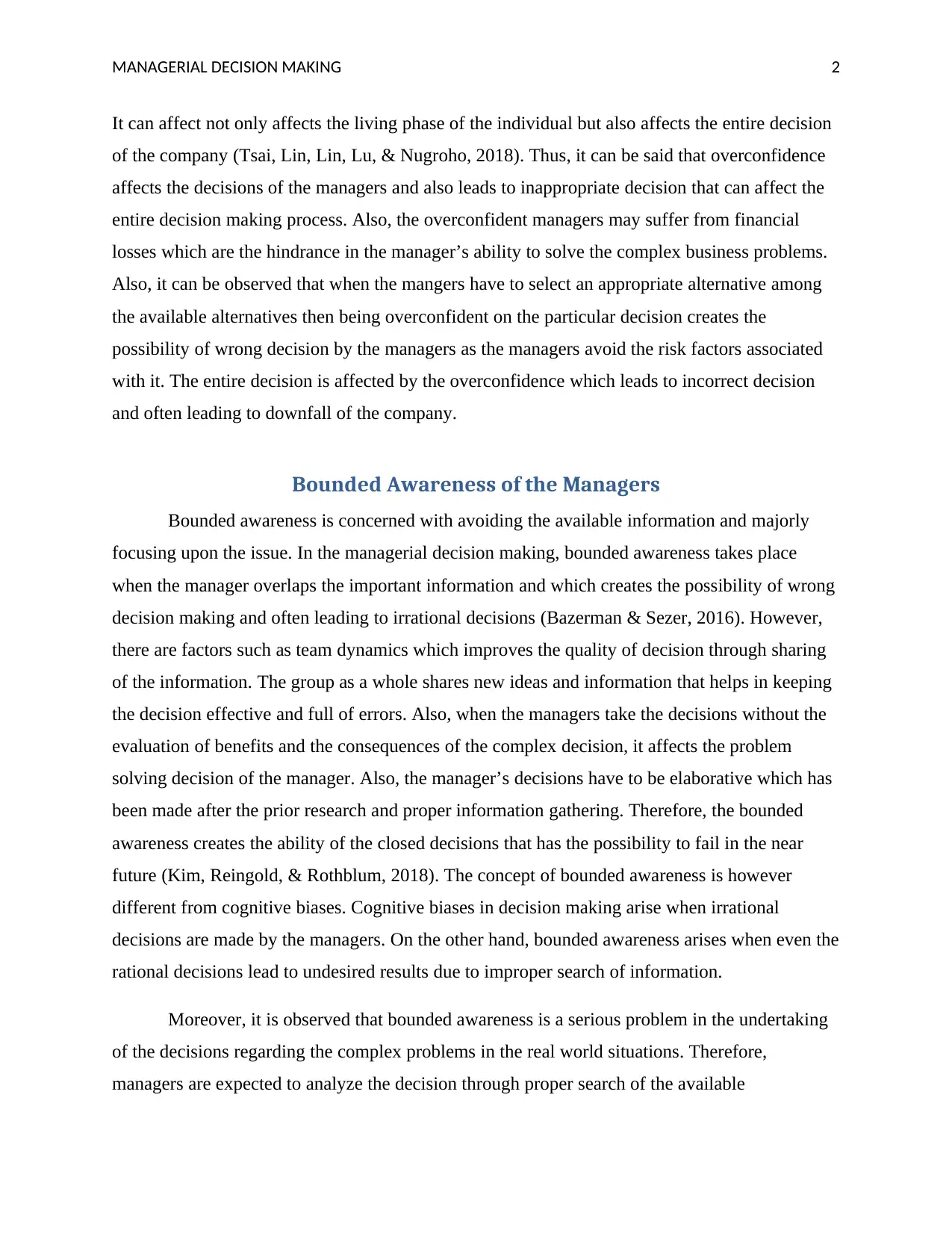
MANAGERIAL DECISION MAKING 2
It can affect not only affects the living phase of the individual but also affects the entire decision
of the company (Tsai, Lin, Lin, Lu, & Nugroho, 2018). Thus, it can be said that overconfidence
affects the decisions of the managers and also leads to inappropriate decision that can affect the
entire decision making process. Also, the overconfident managers may suffer from financial
losses which are the hindrance in the manager’s ability to solve the complex business problems.
Also, it can be observed that when the mangers have to select an appropriate alternative among
the available alternatives then being overconfident on the particular decision creates the
possibility of wrong decision by the managers as the managers avoid the risk factors associated
with it. The entire decision is affected by the overconfidence which leads to incorrect decision
and often leading to downfall of the company.
Bounded Awareness of the Managers
Bounded awareness is concerned with avoiding the available information and majorly
focusing upon the issue. In the managerial decision making, bounded awareness takes place
when the manager overlaps the important information and which creates the possibility of wrong
decision making and often leading to irrational decisions (Bazerman & Sezer, 2016). However,
there are factors such as team dynamics which improves the quality of decision through sharing
of the information. The group as a whole shares new ideas and information that helps in keeping
the decision effective and full of errors. Also, when the managers take the decisions without the
evaluation of benefits and the consequences of the complex decision, it affects the problem
solving decision of the manager. Also, the manager’s decisions have to be elaborative which has
been made after the prior research and proper information gathering. Therefore, the bounded
awareness creates the ability of the closed decisions that has the possibility to fail in the near
future (Kim, Reingold, & Rothblum, 2018). The concept of bounded awareness is however
different from cognitive biases. Cognitive biases in decision making arise when irrational
decisions are made by the managers. On the other hand, bounded awareness arises when even the
rational decisions lead to undesired results due to improper search of information.
Moreover, it is observed that bounded awareness is a serious problem in the undertaking
of the decisions regarding the complex problems in the real world situations. Therefore,
managers are expected to analyze the decision through proper search of the available
It can affect not only affects the living phase of the individual but also affects the entire decision
of the company (Tsai, Lin, Lin, Lu, & Nugroho, 2018). Thus, it can be said that overconfidence
affects the decisions of the managers and also leads to inappropriate decision that can affect the
entire decision making process. Also, the overconfident managers may suffer from financial
losses which are the hindrance in the manager’s ability to solve the complex business problems.
Also, it can be observed that when the mangers have to select an appropriate alternative among
the available alternatives then being overconfident on the particular decision creates the
possibility of wrong decision by the managers as the managers avoid the risk factors associated
with it. The entire decision is affected by the overconfidence which leads to incorrect decision
and often leading to downfall of the company.
Bounded Awareness of the Managers
Bounded awareness is concerned with avoiding the available information and majorly
focusing upon the issue. In the managerial decision making, bounded awareness takes place
when the manager overlaps the important information and which creates the possibility of wrong
decision making and often leading to irrational decisions (Bazerman & Sezer, 2016). However,
there are factors such as team dynamics which improves the quality of decision through sharing
of the information. The group as a whole shares new ideas and information that helps in keeping
the decision effective and full of errors. Also, when the managers take the decisions without the
evaluation of benefits and the consequences of the complex decision, it affects the problem
solving decision of the manager. Also, the manager’s decisions have to be elaborative which has
been made after the prior research and proper information gathering. Therefore, the bounded
awareness creates the ability of the closed decisions that has the possibility to fail in the near
future (Kim, Reingold, & Rothblum, 2018). The concept of bounded awareness is however
different from cognitive biases. Cognitive biases in decision making arise when irrational
decisions are made by the managers. On the other hand, bounded awareness arises when even the
rational decisions lead to undesired results due to improper search of information.
Moreover, it is observed that bounded awareness is a serious problem in the undertaking
of the decisions regarding the complex problems in the real world situations. Therefore,
managers are expected to analyze the decision through proper search of the available
⊘ This is a preview!⊘
Do you want full access?
Subscribe today to unlock all pages.

Trusted by 1+ million students worldwide
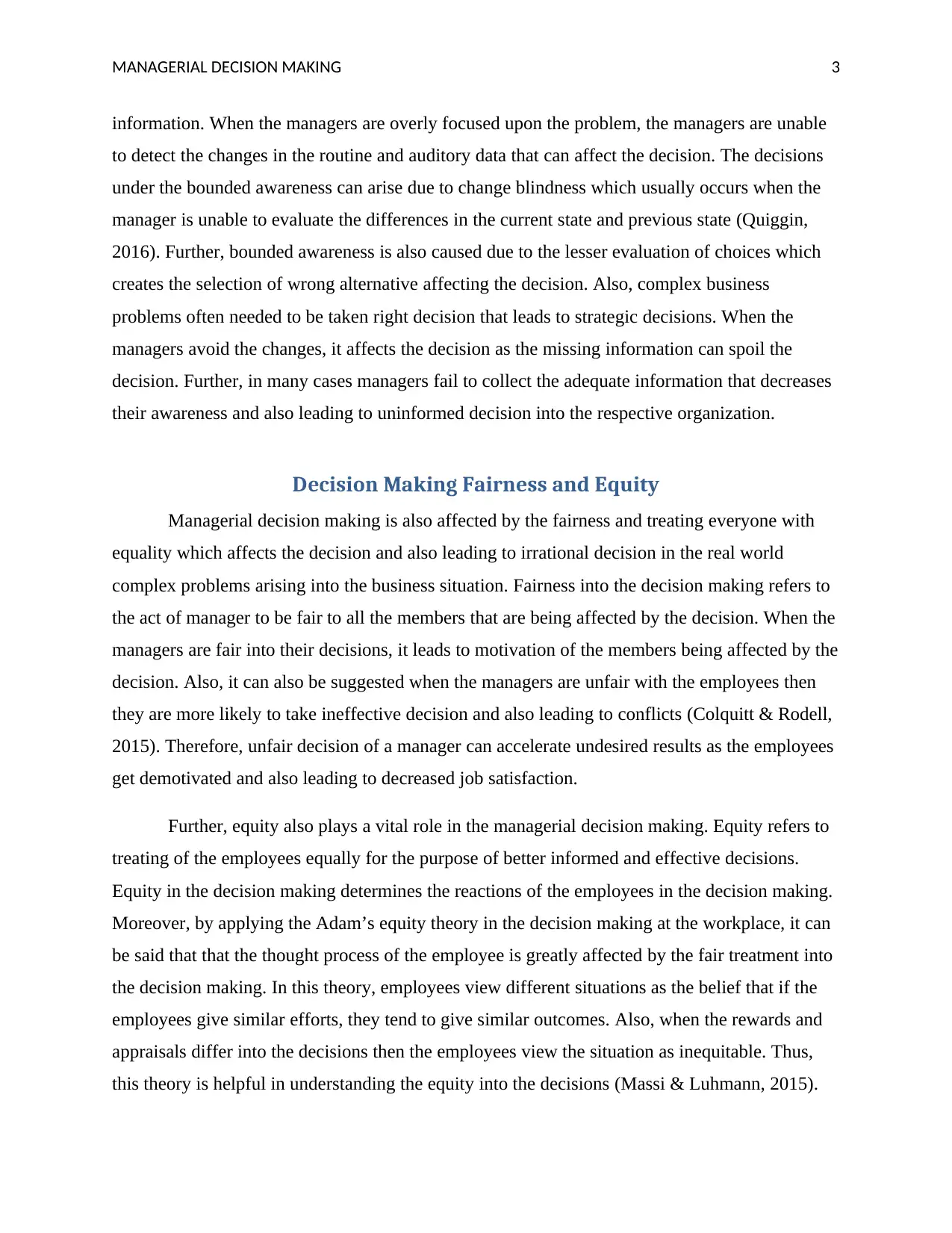
MANAGERIAL DECISION MAKING 3
information. When the managers are overly focused upon the problem, the managers are unable
to detect the changes in the routine and auditory data that can affect the decision. The decisions
under the bounded awareness can arise due to change blindness which usually occurs when the
manager is unable to evaluate the differences in the current state and previous state (Quiggin,
2016). Further, bounded awareness is also caused due to the lesser evaluation of choices which
creates the selection of wrong alternative affecting the decision. Also, complex business
problems often needed to be taken right decision that leads to strategic decisions. When the
managers avoid the changes, it affects the decision as the missing information can spoil the
decision. Further, in many cases managers fail to collect the adequate information that decreases
their awareness and also leading to uninformed decision into the respective organization.
Decision Making Fairness and Equity
Managerial decision making is also affected by the fairness and treating everyone with
equality which affects the decision and also leading to irrational decision in the real world
complex problems arising into the business situation. Fairness into the decision making refers to
the act of manager to be fair to all the members that are being affected by the decision. When the
managers are fair into their decisions, it leads to motivation of the members being affected by the
decision. Also, it can also be suggested when the managers are unfair with the employees then
they are more likely to take ineffective decision and also leading to conflicts (Colquitt & Rodell,
2015). Therefore, unfair decision of a manager can accelerate undesired results as the employees
get demotivated and also leading to decreased job satisfaction.
Further, equity also plays a vital role in the managerial decision making. Equity refers to
treating of the employees equally for the purpose of better informed and effective decisions.
Equity in the decision making determines the reactions of the employees in the decision making.
Moreover, by applying the Adam’s equity theory in the decision making at the workplace, it can
be said that that the thought process of the employee is greatly affected by the fair treatment into
the decision making. In this theory, employees view different situations as the belief that if the
employees give similar efforts, they tend to give similar outcomes. Also, when the rewards and
appraisals differ into the decisions then the employees view the situation as inequitable. Thus,
this theory is helpful in understanding the equity into the decisions (Massi & Luhmann, 2015).
information. When the managers are overly focused upon the problem, the managers are unable
to detect the changes in the routine and auditory data that can affect the decision. The decisions
under the bounded awareness can arise due to change blindness which usually occurs when the
manager is unable to evaluate the differences in the current state and previous state (Quiggin,
2016). Further, bounded awareness is also caused due to the lesser evaluation of choices which
creates the selection of wrong alternative affecting the decision. Also, complex business
problems often needed to be taken right decision that leads to strategic decisions. When the
managers avoid the changes, it affects the decision as the missing information can spoil the
decision. Further, in many cases managers fail to collect the adequate information that decreases
their awareness and also leading to uninformed decision into the respective organization.
Decision Making Fairness and Equity
Managerial decision making is also affected by the fairness and treating everyone with
equality which affects the decision and also leading to irrational decision in the real world
complex problems arising into the business situation. Fairness into the decision making refers to
the act of manager to be fair to all the members that are being affected by the decision. When the
managers are fair into their decisions, it leads to motivation of the members being affected by the
decision. Also, it can also be suggested when the managers are unfair with the employees then
they are more likely to take ineffective decision and also leading to conflicts (Colquitt & Rodell,
2015). Therefore, unfair decision of a manager can accelerate undesired results as the employees
get demotivated and also leading to decreased job satisfaction.
Further, equity also plays a vital role in the managerial decision making. Equity refers to
treating of the employees equally for the purpose of better informed and effective decisions.
Equity in the decision making determines the reactions of the employees in the decision making.
Moreover, by applying the Adam’s equity theory in the decision making at the workplace, it can
be said that that the thought process of the employee is greatly affected by the fair treatment into
the decision making. In this theory, employees view different situations as the belief that if the
employees give similar efforts, they tend to give similar outcomes. Also, when the rewards and
appraisals differ into the decisions then the employees view the situation as inequitable. Thus,
this theory is helpful in understanding the equity into the decisions (Massi & Luhmann, 2015).
Paraphrase This Document
Need a fresh take? Get an instant paraphrase of this document with our AI Paraphraser
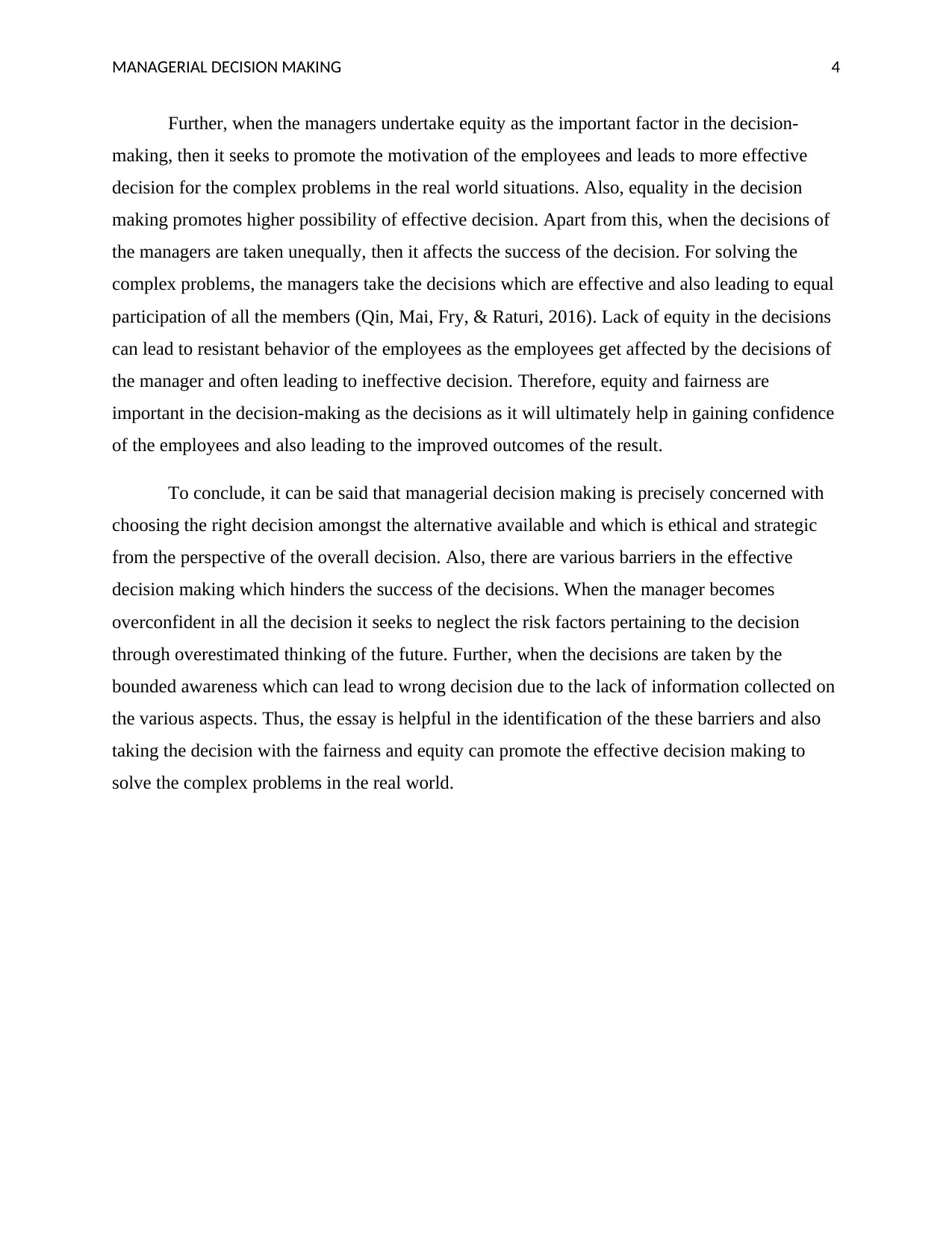
MANAGERIAL DECISION MAKING 4
Further, when the managers undertake equity as the important factor in the decision-
making, then it seeks to promote the motivation of the employees and leads to more effective
decision for the complex problems in the real world situations. Also, equality in the decision
making promotes higher possibility of effective decision. Apart from this, when the decisions of
the managers are taken unequally, then it affects the success of the decision. For solving the
complex problems, the managers take the decisions which are effective and also leading to equal
participation of all the members (Qin, Mai, Fry, & Raturi, 2016). Lack of equity in the decisions
can lead to resistant behavior of the employees as the employees get affected by the decisions of
the manager and often leading to ineffective decision. Therefore, equity and fairness are
important in the decision-making as the decisions as it will ultimately help in gaining confidence
of the employees and also leading to the improved outcomes of the result.
To conclude, it can be said that managerial decision making is precisely concerned with
choosing the right decision amongst the alternative available and which is ethical and strategic
from the perspective of the overall decision. Also, there are various barriers in the effective
decision making which hinders the success of the decisions. When the manager becomes
overconfident in all the decision it seeks to neglect the risk factors pertaining to the decision
through overestimated thinking of the future. Further, when the decisions are taken by the
bounded awareness which can lead to wrong decision due to the lack of information collected on
the various aspects. Thus, the essay is helpful in the identification of the these barriers and also
taking the decision with the fairness and equity can promote the effective decision making to
solve the complex problems in the real world.
Further, when the managers undertake equity as the important factor in the decision-
making, then it seeks to promote the motivation of the employees and leads to more effective
decision for the complex problems in the real world situations. Also, equality in the decision
making promotes higher possibility of effective decision. Apart from this, when the decisions of
the managers are taken unequally, then it affects the success of the decision. For solving the
complex problems, the managers take the decisions which are effective and also leading to equal
participation of all the members (Qin, Mai, Fry, & Raturi, 2016). Lack of equity in the decisions
can lead to resistant behavior of the employees as the employees get affected by the decisions of
the manager and often leading to ineffective decision. Therefore, equity and fairness are
important in the decision-making as the decisions as it will ultimately help in gaining confidence
of the employees and also leading to the improved outcomes of the result.
To conclude, it can be said that managerial decision making is precisely concerned with
choosing the right decision amongst the alternative available and which is ethical and strategic
from the perspective of the overall decision. Also, there are various barriers in the effective
decision making which hinders the success of the decisions. When the manager becomes
overconfident in all the decision it seeks to neglect the risk factors pertaining to the decision
through overestimated thinking of the future. Further, when the decisions are taken by the
bounded awareness which can lead to wrong decision due to the lack of information collected on
the various aspects. Thus, the essay is helpful in the identification of the these barriers and also
taking the decision with the fairness and equity can promote the effective decision making to
solve the complex problems in the real world.
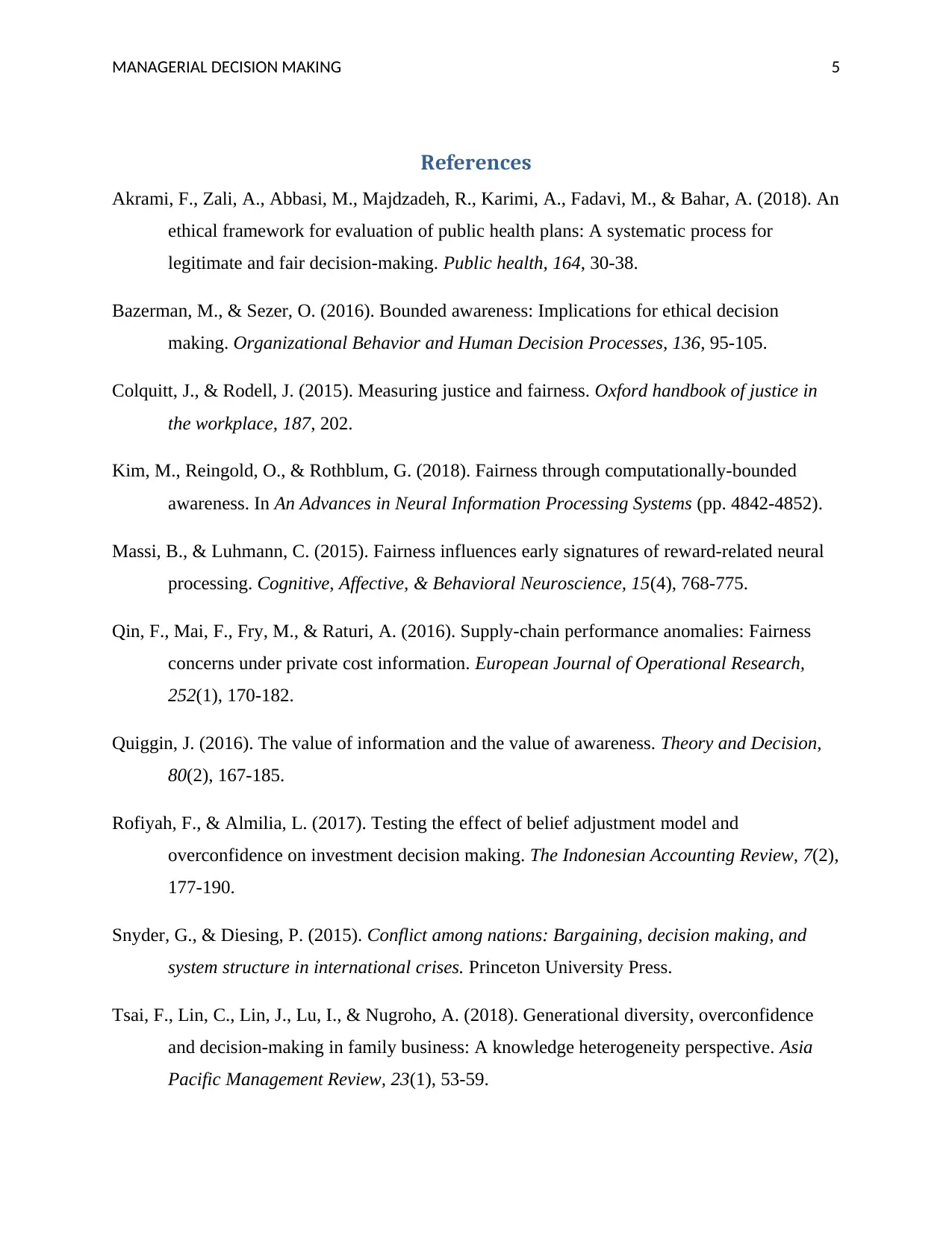
MANAGERIAL DECISION MAKING 5
References
Akrami, F., Zali, A., Abbasi, M., Majdzadeh, R., Karimi, A., Fadavi, M., & Bahar, A. (2018). An
ethical framework for evaluation of public health plans: A systematic process for
legitimate and fair decision-making. Public health, 164, 30-38.
Bazerman, M., & Sezer, O. (2016). Bounded awareness: Implications for ethical decision
making. Organizational Behavior and Human Decision Processes, 136, 95-105.
Colquitt, J., & Rodell, J. (2015). Measuring justice and fairness. Oxford handbook of justice in
the workplace, 187, 202.
Kim, M., Reingold, O., & Rothblum, G. (2018). Fairness through computationally-bounded
awareness. In An Advances in Neural Information Processing Systems (pp. 4842-4852).
Massi, B., & Luhmann, C. (2015). Fairness influences early signatures of reward-related neural
processing. Cognitive, Affective, & Behavioral Neuroscience, 15(4), 768-775.
Qin, F., Mai, F., Fry, M., & Raturi, A. (2016). Supply-chain performance anomalies: Fairness
concerns under private cost information. European Journal of Operational Research,
252(1), 170-182.
Quiggin, J. (2016). The value of information and the value of awareness. Theory and Decision,
80(2), 167-185.
Rofiyah, F., & Almilia, L. (2017). Testing the effect of belief adjustment model and
overconfidence on investment decision making. The Indonesian Accounting Review, 7(2),
177-190.
Snyder, G., & Diesing, P. (2015). Conflict among nations: Bargaining, decision making, and
system structure in international crises. Princeton University Press.
Tsai, F., Lin, C., Lin, J., Lu, I., & Nugroho, A. (2018). Generational diversity, overconfidence
and decision-making in family business: A knowledge heterogeneity perspective. Asia
Pacific Management Review, 23(1), 53-59.
References
Akrami, F., Zali, A., Abbasi, M., Majdzadeh, R., Karimi, A., Fadavi, M., & Bahar, A. (2018). An
ethical framework for evaluation of public health plans: A systematic process for
legitimate and fair decision-making. Public health, 164, 30-38.
Bazerman, M., & Sezer, O. (2016). Bounded awareness: Implications for ethical decision
making. Organizational Behavior and Human Decision Processes, 136, 95-105.
Colquitt, J., & Rodell, J. (2015). Measuring justice and fairness. Oxford handbook of justice in
the workplace, 187, 202.
Kim, M., Reingold, O., & Rothblum, G. (2018). Fairness through computationally-bounded
awareness. In An Advances in Neural Information Processing Systems (pp. 4842-4852).
Massi, B., & Luhmann, C. (2015). Fairness influences early signatures of reward-related neural
processing. Cognitive, Affective, & Behavioral Neuroscience, 15(4), 768-775.
Qin, F., Mai, F., Fry, M., & Raturi, A. (2016). Supply-chain performance anomalies: Fairness
concerns under private cost information. European Journal of Operational Research,
252(1), 170-182.
Quiggin, J. (2016). The value of information and the value of awareness. Theory and Decision,
80(2), 167-185.
Rofiyah, F., & Almilia, L. (2017). Testing the effect of belief adjustment model and
overconfidence on investment decision making. The Indonesian Accounting Review, 7(2),
177-190.
Snyder, G., & Diesing, P. (2015). Conflict among nations: Bargaining, decision making, and
system structure in international crises. Princeton University Press.
Tsai, F., Lin, C., Lin, J., Lu, I., & Nugroho, A. (2018). Generational diversity, overconfidence
and decision-making in family business: A knowledge heterogeneity perspective. Asia
Pacific Management Review, 23(1), 53-59.
⊘ This is a preview!⊘
Do you want full access?
Subscribe today to unlock all pages.

Trusted by 1+ million students worldwide
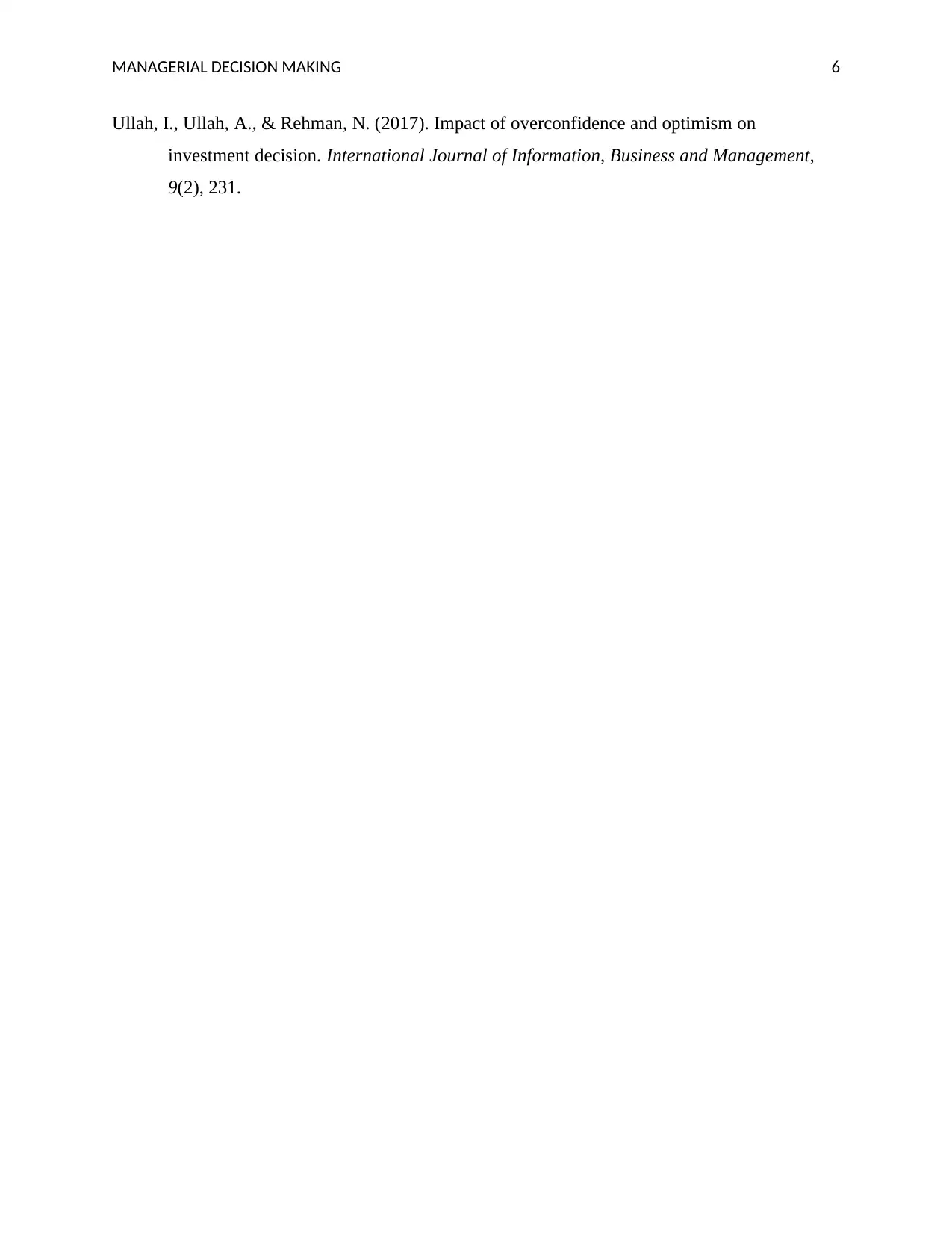
MANAGERIAL DECISION MAKING 6
Ullah, I., Ullah, A., & Rehman, N. (2017). Impact of overconfidence and optimism on
investment decision. International Journal of Information, Business and Management,
9(2), 231.
Ullah, I., Ullah, A., & Rehman, N. (2017). Impact of overconfidence and optimism on
investment decision. International Journal of Information, Business and Management,
9(2), 231.
1 out of 7
Related Documents
Your All-in-One AI-Powered Toolkit for Academic Success.
+13062052269
info@desklib.com
Available 24*7 on WhatsApp / Email
![[object Object]](/_next/static/media/star-bottom.7253800d.svg)
Unlock your academic potential
Copyright © 2020–2026 A2Z Services. All Rights Reserved. Developed and managed by ZUCOL.





